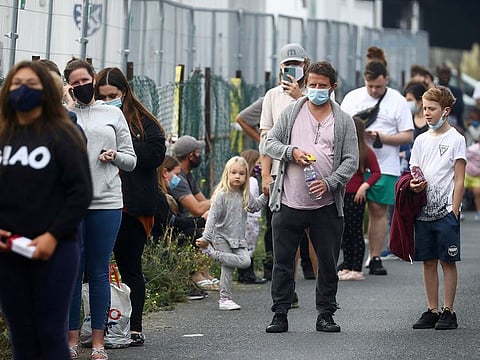COVID-19: Stiff penalty effective way to deter violators
People have a responsibility to follow coronavirus safety protocols and report violations

Shortly after the World Health Organisation declared Coronavirus a pandemic in March, governments worldwide scrambled to come up with an effective response mechanism to deal with the disease. A typical a knee-jerk reaction in many nations was to impose tough lockdowns.
Large cities, factories, businesses and public transport systems were ordered shut in order to prevent people from moving out of their homes. In the subsequent weeks and months, authorities began to learn a valuable lesson — that shutting down nations and cities was counterproductive and inflicted a heavy cost on the economy.
Since then, movement restrictions targeted specific hotspots and gradually cities were allowed to resume daily activities. This was a big lesson and a turning point in the global fight against the virus.
The UAE also has declared a war on violators of safety norms, shutting down scores of eating joints, sports facilities and retail stores in recent days. Individuals have also been fined for hosting celebratory gatherings at homes and strict guidelines have been issued for weddings, restricting the number of guestsGulf News
Weeks after adopting this calibrated approach, the world is learning a second big lesson — that hundred per cent compliance of public health safety measures is possible only when violators face a heavy cost for their reckless behaviour. People and businesses misconstrued lifting of lockdowns as the return of pre-Coronavirus normality and threw safety norms out of the window.
In the last two weeks or so, governments in several continents have imposed a significant financial cost on reckless behaviour. England, for example, said infected people who refuse to self-isolate will face fines up to 10,000 pounds from September 28. Health authorities fined 19,000 in England and Wales for health safety laws.
Growth in daily infections
The UAE also has declared a war on violators of safety norms, shutting down scores of eating joints, sports facilities and retail stores in recent days. Individuals have also been fined for hosting celebratory gatherings at homes and strict guidelines have been issued for weddings, restricting the number of guests.
In India too public compliance of safety measures remains poor despite the alarming growth in daily infections. Officials in New Delhi this week said they fined over 180,000 for violating coronavirus protocol, including those found without masks.
The infection rate is growing in many parts of the world in what some epidemiologists have described as the second wave and authorities have no option left but to crackdown and impose a stiff penalty on violators.
People too have a responsibility to not just willingly follow safety protocols but also report violations by business owners and individuals. This is the only way to contain the virus and prevent the second wave from becoming a mass disrupter of our lives.








